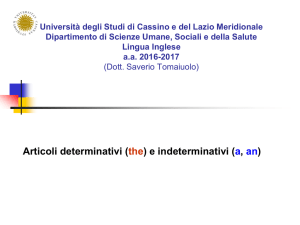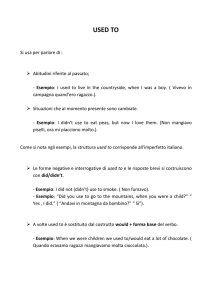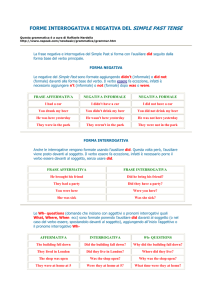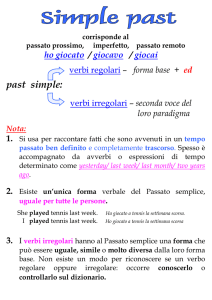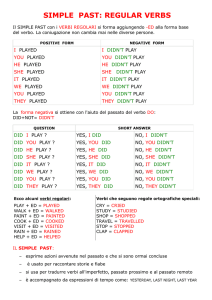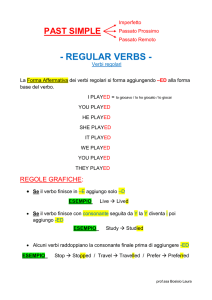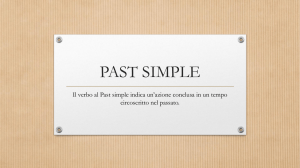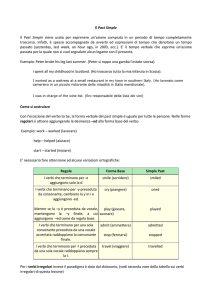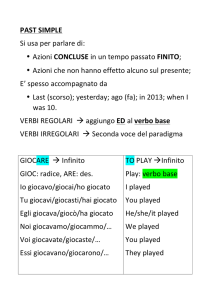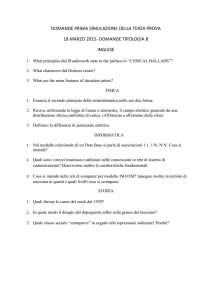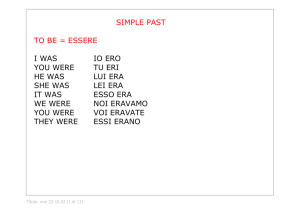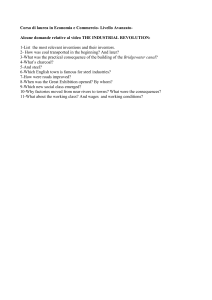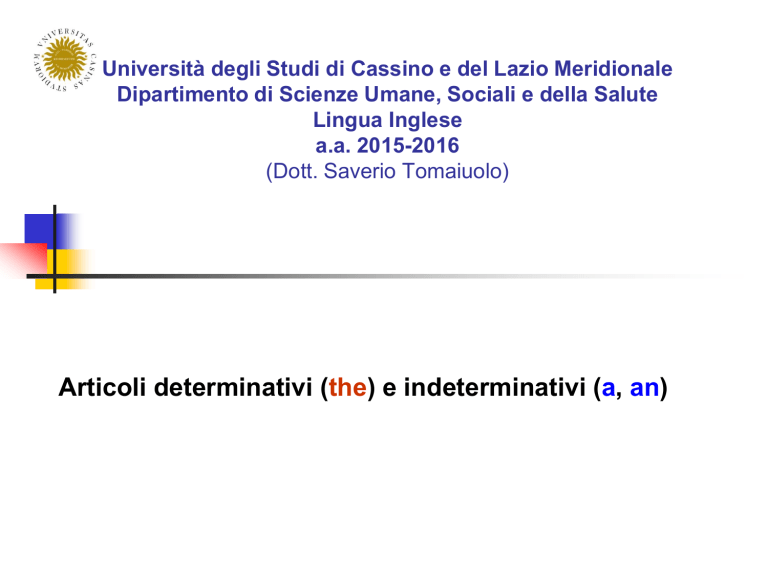
Università degli Studi di Cassino e del Lazio Meridionale
Dipartimento di Scienze Umane, Sociali e della Salute
Lingua Inglese
a.a. 2015-2016
(Dott. Saverio Tomaiuolo)
Articoli determinativi (the) e indeterminativi (a, an)
Articolo determinativo (the)
Si utilizza in inglese l’articolo determinativo sia con i nomi singolari che con quelli
plurali:
the knee / the knees; the leg / the legs; the arm / the arms
Si utilizza l’articolo determinativo per riferirsi a qualcosa o qualcuno di specifico:
The boys in the room are noisy;
The runners over there are really fast;
The teachers in that school are qualified,
The shoes on the floor aren’t comfortable.
ATTENZIONE: Se invece ci si riferisce a categorie generali (dunque di solito
parlando al plurale) NON SI USA l’articolo:
Boys are noisy;
American athletes are really fast;
Teachers must be qualified;
Shoes must be comfortable.
Si utilizza inoltre l’articolo determinativo anche per indicare:
i fiumi (The River Po),
i mari (The Atlantic Ocean),
le catene di montagne (The Ardennes),
le confederazioni di stati (The USA, The Netherlands).
ATTENZIONE: NON SI USA l’articolo determinativo parlando di singole
nazioni (Italy, Germany) e singole montagne (Mont Blanc).
NON si utilizza in generale l’articolo determinativo con numerosi nomi
astratti:
good, evil, heaven, hell, peace, war (ma si dirà, parlando di argomenti
specifici The War of the Two Roses, The Iraqui War)
NON si usa oltre per riferirsi alla lingua :
German is a difficult language,
Italian has a nice sound
2. Articolo indeterminativo (a, an)
Si utilizza “a” per parole che inizano con la consonante
(a boy, a car, a long journey, a tiring race) o “h” sorda
(a home, a human being)
Si utilizza “an” per parole che iniziano per vocale (an
old town, an athlete) o “h” sonora (an hour)
Esempi:
Italian soccers are young and spoiled.
I’m watching a movie! Don’t make too much noise!
The clarks who work in that bank are very lazy.
My friend says that Italy is the best place in which you
can eat, and that The Netherlands are the best country in
which you can live.
Il past simple del verbo essere (“To be”)
Forma affermativa
I was happy
You were nice
He /she / it was interested in that movie
We were tired
You were unexperienced
They were nasty
Forma Negativa
I was NOT (wasn’t)...
You were NOT (weren’t) ...
He / She / It was NOT (wasn’t) ...
We were NOT (weren’t) ...
You were NOT (weren’t) ..
They were NOT (weren’t) ...
Forma interrogativa
Was I happy with her?
Were you interested in that?
Was he/she/it a good trainer?
Were we prepared for the exam?
Were you in Rome yesterday?
Were they good swimmers?
ATTENZIONE: per indicare la nascita, si utilizza
la forma al passato was/were + born:
When were you born? I was born in 1972, on
January the 23rd/. On the 23rd of January / on 23
January 1972
E’ possibile utilizzare “were” alla prima persona
solo (I were) in alcuni casi:
1) per indicare un auspicio, come ad esempio I
wish I were you
2) con le frasi ipotetiche: if I were you I would call
the police.
Esempi:
I was with him at the cinema yesterday.
I wished you were there on that occasion.
We weren’t with John and Peter two weeks ago
in London. You are wrong.
Were you with him two hours ago?
When were you born? I was born in …..
Il Past Simple dei verbi regolari
Forma affermativa
SOGG + VERBO (all’infinito senza “to”) + suffisso “-ED” (per i verbi regolari)
I played tennis
You played soccer
He / She / It played football
We played the piano
You played chess
They played in a drama
Forma negativa
SOGGETTO + AUSILIARE “DID” + NOT / DIDN’T+ VERBO (all’infinito senza “to”)
I did NOT (didn’t) play tennis
You did NOT (didn’t) play soccer
He / She / It did NOT (didn’t) play football
We did NOT (didn’t) play the piano
You did NOT (didn’t) play chess
They did NOT (didn’t) play in a drama
Forma interrogativa
AUSILIARE “DID” + SOGGETTO + VERBO (all’infinito senza “to”)…?
Did I play tennis?
Did you play soccer?
Did he /she/ it play football?
Did we play the piano
Did you play chess
Did they play in a drama?
Il Past Simple si utilizza per indicare un’azione conclusa nel
passato e che non ha alcun rapporto con il presente, oppure per
raccontare qualcosa avvenuto nel passato (con le espressioni
first…then…after..). Per tale ragione si accompagna ad avverbi
di tempo come yesterday, two years ago, last year, etc…
Si ricordi che anche il PARTICIPIO PASSATO dei verbi regolari
si forma in inglese con l’aggiunta del suffisso “-ED”.
VARIAZIONI ORTOGRAFICHE:
- to pay → paid
- to cry → cried
- to marry→ married
- to die → died
- to stop → stopped
Esempi:
That prime minister managed to solve the ecomonic crisis.
I worked in the Atina Basketball club from 1985 to 1988.
Did you join them last week? No, I didn’t. I was with my family
She didn’t like that performance.
Il Past Simple dei verbi irregolari
Infinito
To have
To go
To come
To win
To swim
To run
To meet
To take
To give
To shoot
To write
To read
To eat
To drink
To see
To hear
To think
To tell
To feed
To bring
To buy
To feel
To break
To fall
To hit
Past Simple
had
went
came
won
swam
ran
met
took
gave
shot
wrote
read
ate
drank
saw
heard
thought
told
fed
brought
bought
felt
broke
fell
hit
Past Participle
had
gone
come
won
swum
run
met
taken
given
shot
written
read
eaten
drunk
seen (confrontare con “to look”)
heard (confrontare con “to listen to”)
thought
told (confrontare con “to say”)
fed
brought
bought
felt
broken
fallen
hit
Esempi:
Did you see what was happening? No I didn’t. I only
saw some people running.
I felt very tired yesterday because I didn’t have breakfast.
It’s a pity. I thought that I had the victory in my hands.
She broke her ankle during that exercise.

